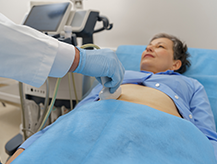Can a pregnancy test detect ovarian cancer?

We talk through the link between pregnancy tests and ovarian cancer
Why are we talking about this?
Some women who are concerned they might have ovarian cancer are using home pregnancy test kits in the belief that a positive result could diagnose them with the disease.
Why do people think a pregnancy test can detect ovarian cancer?
During the early stages of pregnancy a woman’s body produces increased levels of a hormone called human chorionic gonadotropin (hCG), which will be detected by the more sensitive home tests and produce a positive result.
An increased level of hCG may also sometimes be seen in a woman who has an early stage of a rare type of ovarian cancer called germ cell cancer, so there is a chance that if someone with this type of cancer does a home pregnancy test, they would get a positive result. This is why there have been some very rare occasions where ovarian cancer has caused a false positive to occur on a home pregnancy test, but it is not normally the case.
Should I do a pregnancy test to see if I have ovarian cancer?
No. A home pregnancy test is not a valid or reliable route to diagnosing ovarian cancer. The incidences of a positive result being due to ovarian cancer, as opposed to an actual pregnancy, are minimal. The only way to accurately detect ovarian cancer is to have a proper investigations which include
- physical examination
- blood test for tumour markers such as CA125
- imaging including ultrasound/CT
- conformation via biopsy
What should I do if I am concerned about ovarian cancer?
If you think you have any of the symptoms of ovarian cancer, or are just concerned that something is not right, then you should make an appointment to see your GP as soon as possible. To make this easier we have produced a symptoms diary that can be used to note down exactly what symptoms you are experiencing, and how persistent and severe they are.
It is worth noting that unlike cervical, bowel and breast cancers, there is still no reliable, effective screening method for ovarian cancer. Ovarian Cancer Action is hoping to change this through funding research into the development of the world's first ovarian cancer screening tool. Find out more about this research.


